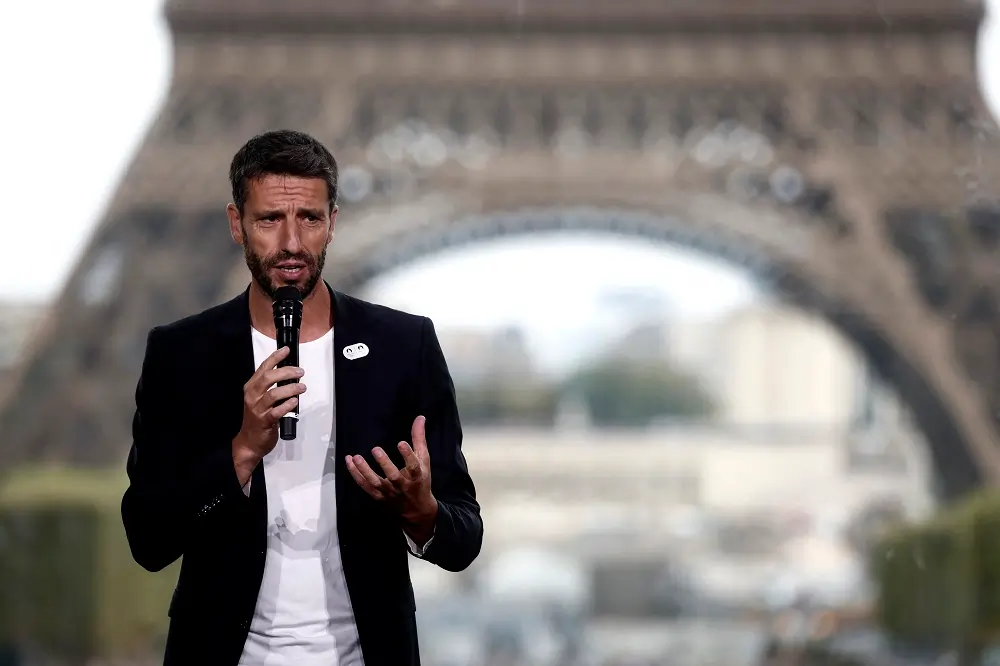
PARIS (Reuters) – The Olympics cannot be expected to solve armed conflicts, but it can pacify relations and open the door for dialogue, Paris 2024 president Tony Estanguet told Reuters as the Games prepares to deal with issues arising from the wars in Ukraine and Gaza.
Sports authorities have been criticised for allowing some Russian and Belarusian athletes to compete in this year’s Olympics following Russia’s invasion of Ukraine, for which Belarus has been used as a staging ground.
The International Olympic Committee (IOC) in December ruled that Russians and Belarusians who qualify in their sports for the Paris Games can take part as neutrals without flags, emblems or anthems, angering Ukraine who had demanded a ban.
The war in Gaza has also affected the build-up to Paris 2024, raising questions about the safety of the Israel delegation, 52 years after 11 sportsmen, coaches and a referee were killed in an attack by Palestinian gunmen on the Israeli team’s quarters in the Olympic village in Munich.
Estanguet said that all athletes taking part in the Games should be guaranteed safety and respect, but the Olympics could not be expected to provide solutions to global conflicts.
“It’s hard to know six months down the line whether things are going to get worse or calmer,” Estanguet, who won Olympic canoeing gold at the 2000, 2004 and 2012 Games, told Reuters.
“You have to stay in your place, not think that the Games are a magic wand that will solve all the problems and armed conflicts in our world, but with the deep conviction that they have a tendency to pacify relations and leave a space for dialogue and positive expression, and that each delegation, each qualified athlete must be respected.”
Paris mayor Anne Hidalgo last year said she was opposed to Russian competitors at the 2024 Games, calling their participation “obscene”.
Yet only the IOC decides who can take part in the Olympics, not the hosts, which Estanguet believes is how it should be.
“I find it reassuring to see that, on such a complex subject, it’s not the organising country that decides which countries can take part in an event,” he said.
“In 2014 in Russia (Sochi) and in 2022 in China (Beijing), at no time were these nations able to influence which countries could take part in the Olympic and Paralympic Games, and I think that’s healthy.”
Estanguet, Hidalgo and French President Emmanuel Macron received an open letter from 192 Ukrainian athletes asking them to exclude Russians from the Paris Olympics.
ISRAEL CLOSELY WATCHED
Estanguet suggested the Israeli delegation was likely to receive special attention during the Games.
Israel unleashed a campaign to eliminate Iran-backed Hamas after militants burst into Israel on Oct. 7 and rampaged through southern towns and bases, killing 1,200 people, most of them civilians, and taking 253 hostages back to Gaza.
The Hamas-run Gaza health ministry said over 25,000 Palestinians – many of them women and children – have been killed in Israeli strikes since Oct. 7.
“We are taking a very strict approach to all the delegations, with the Prefecture of Police and the State working with the intelligence services,” he said.
“I’ve been to the Games (four times as an athlete), and we know that this is a delegation that, given what happened at the Munich Games in particular, is extremely closely watched and accompanied to guarantee its security at the time of the Games.
“The threat level is regularly updated so that the police and security services can guarantee that every participant in the Games and every spectator who comes to experience the magic of the Games will be in complete safety.”
The security budget for the Paris 2024 Games has been estimated at around 300 million euros ($326.55 million) but is likely to be much higher.
“Security remains a priority at the Olympics, and we expect that there will be demonstrations and demands. We are a free country where people can put forward their ideas, but we want them to be peaceful and respectful of all those who want to enjoy the festivities,” said Estanguet.
“We will manage the situation as it arises, and we need to be able to react immediately as best we can, respecting the integrity of everyone involved, not overreacting, and guaranteeing the continuity of the Games’ operations. We want to welcome the athletes in the best possible conditions.”
(Reporting by Julien Pretot; Editing by Toby Davis)


